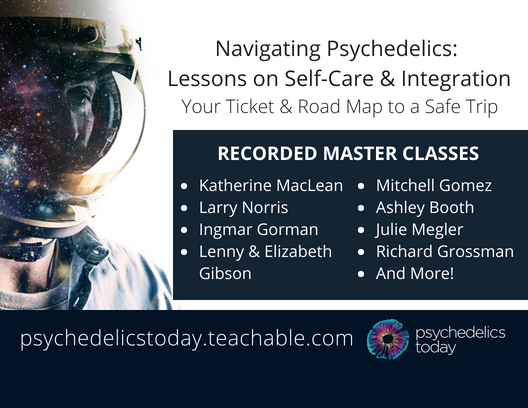Download
In this episode, Kyle talks with Tom Lane, author of Sacred Mushroom Rituals: The Search for the Blood of Quetzalcoatl. In the episode, they discuss the history of Quetzalcoatl, the ceremony of the deified heart and sacred mushroom rituals.
3 Key Points:
- Quetzalcoatl is a feathered-serpent deity of ancient Mesoamerican culture that can come to you when partaking in the ceremony of the deified heart. Quetzalcoatl teaches how to overcome fear and hatred and bring love.
- The ceremony of the deified heart is a sacred mushroom ritual that when methods are combined correctly, can bring about Quetzalcoatl.
- In the episode, Tom tells intriguing stories of his experiences with mushroom rituals and experiencing Quetzalcoatl, including a ceremony with Maria Sabina.
Support the show
- Patreon
- Leave us a review on iTunes
- Share us with your friends – favorite podcast, etc
- Join our Facebook group - Psychedelics Today group – Find the others and create community.
Navigating Psychedelics
Trip Journal Integration Workbook


Show Notes
Quetzalcoatl
- He was not an Aztec, he originated as a King in the Toltec civilization thousands of years before the Aztecs
- As legend has it, where his blood fell is where the sacred mushrooms grew
- Some people believe he was a Naga, a combination flow of energy, a male/female serpent
- A winged, jeweled, male/female, serpent
- In the ceremony of the deified heart, the serpent will come to you
About Tom
- He was building geodesic domes in a remote area in Mexico
- He had some of his first mushroom experiences, and it led him to realize that the story of mushrooms was about Quetzalcoatl
- His first experience with the mushroom was mild
- He said the mushrooms found him, he takes them as a sacrament
Ceremony of the Deified Heart
- The legend was that Quetzalcoatl gave cacao to participants as an aphrodisiac and it would help release serotonin
- The goal is not to talk a lot
- Then, the mushrooms are to be retrieved from the ground, fresh
- Before the ceremony, Tom says he likes to put four candles placed in all four directions
- The key to eating the mushrooms is eating them totally covered with honey
- You eat them two at a time, as it represents the male and female
- And when you eat the mushrooms, you actually never swallow
- You chew and chew and the mucous membranes of your tongue take the psilocin straight to the brain and spine
- He says once it starts to take effect, it feels like there is a snake up your spine (He mentions his friends call this Kundalini)
- Then you go out and Quetzalcoatl will come
- When he comes, he is like a rainbow jeweled serpent, an embodiment of pure light, pure energy, pure love
- Tom says the next day it feels like you're 10 years younger
- Its a pure force of love, an obliteration of the concept of time
- Quetzalcoatl created this ceremony to bring about the serpent for healing, for a balance of male and female
- This ceremony is best done during the night, with thunderstorms in the mountains
Ceremony with Maria Sabina
- One night they went to see Maria Sabina
- She agreed to do a ceremony at night
- Her house was in the mountains and had a thatched roof with no windows or doors and sometimes clouds would come through her house
- During a ceremony a lightning bolt came though the house, in one window and out the other
- Maria’s daughter gave him truffle like mushrooms and he brought them back with him
- Maria’s daughter really tried to learn his name, she repeated it a multitude of times until she said it exactly perfectly so she could say it during the ceremony
Quetzalcoatl Messages
- God gave us love and pain
- We have to learn how to celebrate the pain
- God gave us knowledge, and tools of how to heal the pain
- Tom’s goal is to teach people how to take the sacred mushrooms to meet Quetzalcoatl and find healing, love and peace
- “Once you get rid of the ego, you get rid of fear, and then you have love.” - Tom
- The only way you can overcome hatred and fear is with love
- The body is teaching the mind when consuming the sacred mushroom
- It's best to just try to love people and be kind, and it's all acts of kindness and love that makes a person feel good
Links
Sacred Mushroom Rituals: The Search for the Blood of Quetzalcoatl
About Tom Lane
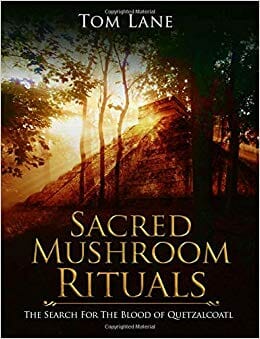
Tom, Author, has a Bachelors in Forestry from the University of Tennessee and a Masters from the University of Florida in Science Education and Middle School Education. He has worked full time in the Solar Energy field as a Contractor and Trainer and has a background in Mushrooms. Tom spent some time in 1973 living in the jungles of Palenque in Mexico and learn about mushrooms and mushroom ceremony. Tom is the Author of the book, Sacred Mushroom Rituals, The Search for the Blood of Quetzalcoatl.
Download
In this episode, Kyle interviews Dr. Alexander Belser, a Clinical Researcher who has done a variety of works in the psychotherapy and psychedelic fields, helping patients heal from depression, OCD, suicide, and other illnesses, all while focusing on gender neutrality and equality. In this episode, they cover topics on privilege, inclusivity and recommendations for the psychedelic space.
3 Key Points:
- Privilege is commonly seen in therapist roles and as well in an individual’s access to treatment. It's important for the psychedelic community to be vocal about privilege and be inclusive of all types of people, all repressed groups.
- Psychedelics have the power to help people come to terms with their own sexuality, as well as become accepting of other individuals sexual identification.
- In order to see more equality in the psychedelic space, we need to confront structural heterosexism and transfobia, retire the male/female therapy diad, and develop acknowledgement in the psychedelic world of the stresses that LGBTQ people face.
Support the show
- Patreon
- Leave us a review on iTunes
- Share us with your friends – favorite podcast, etc
- Join our Facebook group - Psychedelics Today group – Find the others and create community.
Navigating Psychedelics
Trip Journal Integration Workbook


Show Notes
About Alexander
- Alexander started attending psychedelic conferences in college
- He works at Yale currently, treating individuals with major depressive disorders with psilocybin assisted psychotherapy
- He lives in New York and works on a team for the MAPS, MDMA trial for the treatment of PTSD
Queering Psychedelics
- Queering Psychedelics is a Conference put on with the help of Chacruna
- Its an opportunity for Queer folk to come together and talk about psychedelic medicine
- Alexander's presentation was on Queer Critique for the Psychedelic Mystical Experience
Privilege and Inclusivity
- People with more privilege have more power, more access to funding, more access to expanding the research agenda
- Many of the people in psychedelic research are privileged, white, cisgender individuals (and Alexander believes they are using the privilege for good)
- But it's important for the psychedelic community to be vocal about privilege and be inclusive of all types of people, all repressed groups
- Alexander thinks that we need to eliminate the male/female diad
- The typical structure for psychedelic therapy is to have a male cisgender therapist and a female cisgender therapist
- But Alexander thinks this is gender essentializing
- Its totalizing of gender, assuming that the masculinity is held by the male therapist, and femininity is held by the female therapist
- Alexander thinks that the therapists should be more gender neutral
- Its essential to assess the individual needs of the client for specific gender pairing
Recommendations
- Alexander's Reccomendations
- Confront Structural Heterosexism and Transfobia
- Retire the Male/Female Therapy Diad
- Acknowledgement in the Psychedelic world of the stress that LGBTQ people face
- We need to be able to run moderation analyses to see if a type of psychedelic treatment works the same for sexual minority populations as it does for straight folks
- Are there unique clinical considerations for sexual minorities?
- The psychedelic Renaissance is maturing and reaching a point where our approaches can be more inclusive
- He thinks it's important for straight folks to think about this too
- “We all suffer, including straight folks, in a world where the idea of gender and sexuality is firmly printed as either being A or B. It's a disservice to our identities.” - Alexander
- It is common to feel “oneness” after a psychedelic experience, and it's common for gender roles to change throughout the process
- And on the flip side, maybe our perception of other people’s gender (homophobia) transforms from a psychedelic experience, and we can become more accepting of other forms of gender
Mystical Experience
- When people score higher on the mystical experience questionnaire (profound unity, transcendence of time and space) its predictive of their improvements on depression and anxiety
- It's important to be mindful of what value we put on marginalized people’s psychedelic experiences
- The most common issue Alexander sees is people feeling ‘stuck’ in these bodies
Psychedelic medicine encourages (at least in appeal) embodiment
Final Thoughts
- First, we need to come to terms with our own internalized homophobia, transphobia and racism
- Together, we learn from each other, how to dismantle types of patriarchal, homophibic and transphobic structures
- MDMA expanded access may probably end up being very expensive, we need to think about privilege and access to mental healthcare broadly
- It's not just about diversity, Alexander encourages people to create allies
- He has hope that we can proceed with integrity in these topics
Links
Alexander's website
Center for Breakthroughs
About Dr. Alexander Belser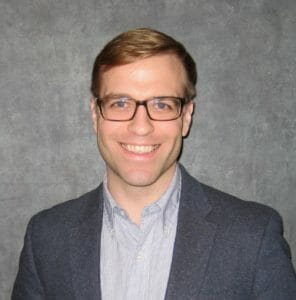
Alexander Belser, Ph.D., is a Clinical Research Fellow and clinical supervisor at Yale University. He is the Co-Investigator of two studies at Yale exploring psychedelic-assisted psychotherapy to treat OCD and depression. His research with sexual minority people has focused on preventing suicide among adolescents and on the protective role of gay-straight alliances for students. Dr. Belser was a founding member of the Psychedelic Research Group at NYU in 2006, and he is currently an Adjunct Faculty member in NYU’s graduate program in Counseling Psychology. He has been a researcher on various psychedelic studies of depression, anxiety, OCD, addiction, trauma, and among religious leaders. He is a study therapist for the MAPS study of MDMA-assisted psychotherapy for PTSD. Dr. Belser serves as a peer reviewer and has published peer-reviewed articles on topics such as psychedelic mysticism, altruism, patient experiences in psilocybin-assisted psychotherapy, cancer and psychedelic therapy, case studies, psilocybin treatment and posttraumatic growth (forthcoming).
In this episode, Kyle interviews Dr. Ido Cohen, co-founder of The Integration Circle. In the show they talk about themes that arise from transformative experiences and the different ways to integrate them through attitude change, environment and community.
3 Key Points:
- A common theme after a transformative experience is the calling for an attitude change. The experience is only the first step, the integration is where the real work begins.
- Environment is a critical part in integration. You can't always change your environment, but you can change your relationship to it by forming new coping mechanisms than the ones used before a transformative experience.
- Joining consciousness events, finding a therapist and looking for integration circles are all great way to not feel so ashamed or alone after a transformative experience.
Support the show
- Patreon
- Leave us a review on iTunes
- Share us with your friends – favorite podcast, etc
- Join our Facebook group - Psychedelics Today group – Find the others and create community.
Navigating Psychedelics
Trip Journal Integration Workbook


Show Notes
About Ido
- Ido is a Clinical Psychologist based in San Francisco
- He works with individuals and couples in integration groups
- Ido graduated from the California Institute of Integral Studies (CIIS)
- He did his post-doctoral internship at C.G. Jung Institute in San Francisco
- He went to India and it opened up the psycho-spiritual realm for him
- He realized there is a lot more to this reality than what we see
- He had a powerful Ayahuasca experience, and it led him to choose his dissertation project
-
- He wanted to know how to take his experience and integrate it into his daily life
Integration
- Ido began talking to people who had big transformative Ayahuasca experiences (pre, during and after)
- He interviewed people at a year out of an Ayahuasca experience, so they had time to reflect
- “For most people, something is calling them. Either curiosity or suffering.” - Ido
- The message comes through a relationship that we are having with something
- People felt that they had to go through something personal before they were able to go into archetypal realms
- A theme afterward was difficulty of re-entry (integration)
- Another common theme was people realizing that they need to change their attitude in order to heal
- It starts with small steps, maybe instead of watching TV for 2 hours you go for a hike for 2 hours, you open up to make room for change
Ego and Self
- Jung’s idea of ego-self access; there is the ego that takes things and organizes them and processes things into our reality, and then the self that is the unconscious, the imaginary and dream state
- The idea is to look at the relationship between the two
- Are they fighting or are they in harmony?
- The role of community is so important
- “We need to learn to integrate not just the negatives, but also the positives.” - Ido
- Having pleasurable experiences can feel unsafe to a person who has been through a lifetime of negatives
Transformative Experiences
- Personal and Environmental
- Most people have these experiences, and come back to the same urban environment, the same work mindset, the same cultural ideals about “achieving”, the instant coffee mentality
- “We want things fast because we don't want to suffer, we don't want to wait, we don't want to invest, we don't want to change.” - Ido
- “When people come back with this new experience but to an old environment, then the question is, ‘How can I not let the pressure of this old environment get in the way of my experience?’” - Ido
- It really is all about changing your attitude
- Maybe go journaling, go into nature, go dancing, etc.
- “How do I honor my process and not succumb to the pressures of using the same coping mechanisms as I had before?” - Ido
- Integration is a complex process
Environment
- You can't always change your environment, but you can change your relationship to your environment
- You can start looking for integration circles
- You can start looking for therapy
- You can go to consciousness events, meditation/yoga groups
- It really depends on the person but it's all about finding resources that help you feel more connected, less ashamed, and less alone
- One of Ido’s clients said to him “I realize I have to break my own heart if I really want to change”
Spiritual Bypass
- Ido suggests a great book on understanding spiritual bypass
- Spiritual Bypassing: When Spirituality Disconnects Us from What Really Matters
- When you start to be really critical about an experience, that's where you need to be more curious
- Shift from criticism to curiosity
- Jung says that this is ‘the lifelong process where we are slowly descending into our authenticity’
Final Thoughts
- Seek community
- Don't do it alone, even if you think you can, you don't have to
- If you're shy, come anyway, were all just doing our best
- Encourage people to seek out knowledgeable communities
- Take yourself seriously, honor these sacred experiences and honor yourself
Links
About Ido Cohen
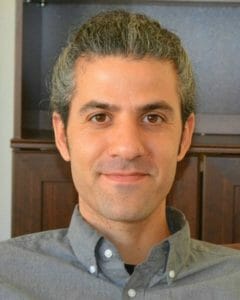
Ido offers depth oriented psychotherapy to the bay area out of San Francisco. Ido conducted his doctoral dissertation study for 6 years, researching the integration process of Ayahuasca ceremonies in western individuals, using a Jungian psychology lens. Ido is committed and passionate about supporting individuals engaging in psychedelic, entheogenic and other consciousness expanding practices, as they integrate their experiences to create long lasting and sustainable change. In addition to his psychotherapy practice, he offers individual and group preparation and integration services.
Download
In this episode, Joe interviews Raquel Bennett, Psy.D. at Kriya Institute. In the show, they cover topics surrounding the properties and paradigms of therapeutic Ketamine use.
3 Key Points:
- The Kriya Institute is devoted to understanding the therapeutic properties of Ketamine. Raquel Bennett specializes in using Ketamine therapy for patients with severe treatment resistant disorders.
- There are three questions that should be used when determining if someone is fit for Ketamine therapy. Is it safe? Is it legal? Is it ethical?
- There are many different paradigms for Ketamine Therapy, but determining the best method for each individual patient is the goal.
Support the show
- Patreon
- Leave us a review on iTunes
- Share us with your friends – favorite podcast, etc
- Join our Facebook group - Psychedelics Today group – Find the others and create community.
Navigating Psychedelics
Trip Journal Integration Workbook


Show Notes
Kriya Institute
- The Kriya Institute deals with how to work with Ketamine specifically in Psychiatry and Psychotherapy
- Kriya provides clinical services to patients, training for other clinicians, and Kriya conference
- The conference is a big collaborative meeting
- Raquel is trying to create a patient assistance fund to make services more available to people
Ketamine
Ketamine isn't addictive physically
It is possible to become psychologically addicted to Ketamine
Raquel thinks its a property of the person not of the object
It's possible to become addicted to anything, shopping, sex, etc.
About Raquel
- She first encountered Ketamine in 2002 when she was suffering from severe depression
- She was seeing a therapist that took her to a psychedelic shaman where she took Ketamine
- From the way she felt after taking Ketamine, she wanted to know if it was replicable for other people
- She is interested in people with treatment resistant mood disorders, such as severe depression, unusual bipolar disorder and people living with active suicidal ideation
- She remembers her teachers (who gave her Ketamine) saying they don't use it often, and don't know if it will work
- They were not seeking an antidepressant effect, they were helping her to connect to the cosmos and the universe, to find out why she was having such severe depression
- The fact that it acted as a rapid-acting antidepressant was a surprise to them, and that's what triggered her curiosity with it
- “Most of what I know of being a Ketamine provider, I learned from being a patient” - Raquel
Ketamine and Patents
- Johnson and Johnson just came out with a filtered Ketamine product that they patented
- $850 for 84mg of filtered Ketamine
- $1.59 for 100mg of generic Ketamine
- They are only providing it as a nasal spray
- Companies tried to make a new molecule, but they couldn't
- Instead, they modified it, and filtered it, and then patented it (Esketamine)
Ketamine Treatment Paradigms
- There is a lot of disagreement on the route, the dose, the setting importance, etc
- This was the reason she created the Kriya conference, to share ideas, to find the best possible methods
- One way is to give it as a low dose infusion out of the anesthesiology model (0.5mg of Ketamine per kg of bodyweight in an infusion center)
- They aim to get enough ketamine in the patient's body without the psychedelic effects
- They take the normal dose, divide it by 6, and space it out to avoid the psychedelic nature
- The patient is being forced into a passive role, they aren't being called to heal themselves, they are just showing up for the medicine
- Raquel says that's not all that there is to it, the medicine is only half of it
- Another paradigm for using Ketamine is facilitated Ketamine Psychotherapy
- In this way, the Ketamine is used as a lubricant for talk therapy
- We are using Ketamine to help people to talk about material that is too painful or too shameful to get to otherwise” - Raquel
- In this paradigm, the emphasis is on the therapy, not the Ketamine, the Ketamine is a lubricant and a tool
- In this way, the patient and the therapist are both participating 50%, the patient is not passive
- She says the psychedelic effects are to be avoided, or else the patient becomes too far out
- The third paradigm would be to induce mystical experience on purpose
- As a provider, it is believed that the visions are meaningful
- Only about 1 in 6 patients are actually a good candidate for psychedelic dosing
- The patient is willing to offer their body up as a vessel, and the messages they receive are from God
- The provider's role is to make sure the journey is safe, and then help the patients to help construct meaning from what they saw, create actionable steps on how to change their lives
- Raquel says that all of these paradigms are helpful, different methods work for different patients
- That’s her job as a Ketamine Specialist, to determine which method is best for patients
- “This is where the direction of the field needs to go, being aware of the spectrum of the services available, and then matching the treatment to the patient. Individualized treatment.” - Raquel
Proper Use
- Is it safe? Is it legal? Is it ethical?
- Is it appropriate to give Ketamine Treatment to someone without a profound impairment or disorder?
- The literature supports the use of Ketamine for the following psychiatric or psychological disorders; major severe refractory depression, bipolar depression, physical pain with depression, recurrent suicidality and obsessive compulsive disorder
- Do the potential benefits verify the potential risks?
- Raquel doesn't believe that making this experience available to everyone is the right way, her goal is to demonstrate that Ketamine is safe and useful for refractory problems
Group Administration
- They can work with 6 clients at a time
- It includes carefully selected individuals that all fit into the group
- This provides a much lower cost for patients
Ketamine Types
- There are 3 Types of Ketamine
- The molecules themselves are not flat, they are 3 dimensional and fold in space
- Some molecules are ‘right handed’ and others are ‘left handed’
- Right handed molecules are Arketamine and left handed are Esketamine
- Generic Ketamine is an even amount of Arketamine and Esketamine molecules
- What Johnson and Johnson did with Esketamine was patenting the filtration process of removing Arketamine from the Esketamine molecules
Kriya Institute Site
- Kriya Conference in November
- A list of providers working with therapeutic Ketamine
- A resource list of books and journey music
- A Contact option
Links
About Raquel Bennett
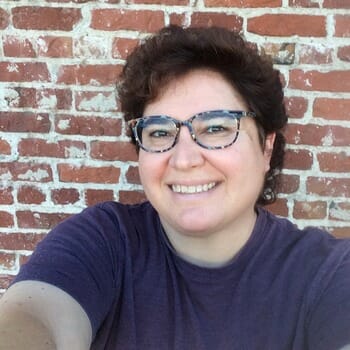
Dr. Bennett is a Post-Doctoral Fellow in Clinical Psychology (PSB 94022544), working under the supervision of Dr. Bravo. Dr. Bennett primarily works with people who are experiencing severe depression, who are on the bipolar spectrum, or who are contemplating suicide. She has been studying the therapeutic properties of ketamine since she first encountered it in 2002. In addition to her clinical work, Dr. Bennett’s practice has evolved to include consultation services for medical professionals who wish to add ketamine services to their offices. She also lectures frequently about therapeutic ketamine. Dr. Bennett is the Founder of KRIYA Institute and the Organizer of the KRIYA Conferences.

